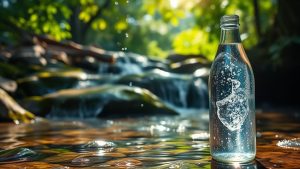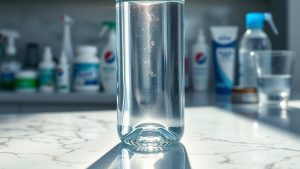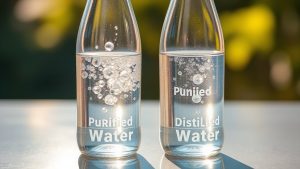
When it comes to baby feeding, distilled water is generally the safer option due to its extreme purity and lack of contaminants. It guarantees that no harmful substances interfere with the formula's nutrient balance. Purified water, while safe, can retain minerals and potentially strip out fluoride, which may be a concern. To make the best choice for your baby's health needs, consider consulting a pediatrician. There's more to discover about the benefits of different water types for your baby.
When it comes to feeding your baby, choosing the right water for formula preparation is vital for their health and development. The decision often comes down to two options: purified water and distilled water. Both types are safe and free from harmful contaminants, but they've distinct characteristics that may influence your choice.
Purified water goes through processes like reverse osmosis, deionization, or carbon filtration, effectively removing impurities while retaining some essential minerals. This means that while purified water is clean, it still contains beneficial elements like calcium and magnesium, which can support your baby's overall health. However, it is important to note that fluoride is removed during the purification process.
Purified water effectively removes impurities while retaining essential minerals like calcium and magnesium for your baby's health.
On the other hand, distilled water is created by boiling water and collecting the steam, which removes nearly all impurities and minerals. If you choose distilled water, you're opting for a product that's stripped of minerals, guaranteeing that nothing interferes with the nutrient balance of the formula.
Experts often recommend distilled water for baby formula preparation due to its extreme purity and lack of contaminants. This water type considerably reduces the risk of overexposure to fluoride, which can lead to fluorosis. While purified water is also a safe choice, you should consider the potential for excess mineral intake, especially if the formula itself is rich in nutrients.
If you're concerned about your baby's specific health needs, consulting a pediatrician can help you determine which water type best suits your situation.
Spring water, while natural, isn't advisable for daily formula preparation. It contains higher levels of naturally occurring minerals, which can interfere with the delicate balance of nutrients in the formula. Additionally, tap water with high mineral content isn't recommended due to the risk of contamination.
To guarantee the safety of your baby, always opt for water types that have been filtered and purified.
When it comes to preparation, both distilled and purified water don't require boiling if they've been properly filtered. This makes them convenient options for busy parents. Bottled versions of these waters are widely available, making them easy to incorporate into your routine.
If you decide to use tap water, boiling it first is vital to eliminate any bacteria or contaminants.
Cost may also play a role in your decision. Distilled water is often viewed as the gold standard for purity, but purified water can be a more cost-effective alternative that still provides a high level of safety.
Ultimately, the choice between distilled and purified water should align with the guidelines provided by the formula manufacturer and consider any specific health concerns for your baby.
Conclusion
When it comes to baby feeding, both purified and distilled water can be safe options, but understanding their differences is key. Curiously, the American Academy of Pediatrics recommends that only 1 in 5 parents use the appropriate water for formula preparation. By choosing the right type of water—free from contaminants—you can help guarantee your baby's health and safety. Ultimately, always consult your pediatrician to make the best choice for your little one.



